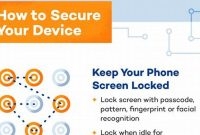Have you ever lost your phone and wished you could easily locate it? Perhaps you’re a parent who wants to keep track of your child’s whereabouts or just want to know where you’ve been for the day. Luckily, tracking your phone’s GPS is easier than you might think. In this article, we’ll walk you through the steps you need to follow to track your phone’s GPS so you can find your lost phone or keep tabs on your location.

How GPS Works
GPS is a satellite-based navigation system that allows you to determine your location in real-time. In order to track your phone’s GPS, it’s important to understand how this technology works.
The Basics of GPS
GPS works by using a network of satellites that orbit the earth. These satellites are constantly sending out signals that are received by GPS receivers, such as those found on your phone. The GPS receiver uses the signals from the satellites to determine the distance between itself and each satellite. By calculating the distance to at least three satellites, the GPS receiver can determine its position in three-dimensional space.
- The GPS system uses a series of 24 satellites that are orbiting the earth at an altitude of around 12,550 miles.
- These satellites are constantly moving, which means that they are moving relative to the earth’s surface.
- Each satellite has an atomic clock, which is used to synchronize the signals it sends out.
The GPS Receiver
Now that you understand how GPS works, it’s time to take a closer look at the GPS receiver itself. Your phone’s GPS receiver is a small chip that is embedded in your device. This chip is responsible for receiving the signals from the GPS satellites, and is what allows your phone to determine its location.
- The GPS receiver on your phone works by picking up the signals sent out by the GPS satellites, and calculating the distance between your phone and each satellite.
- Once your phone has determined its distance from at least three satellites, it can calculate its precise location using a process called trilateration.
- The GPS receiver in your phone also uses a process called assisted GPS, which allows it to determine its location more quickly by using information from nearby cell towers and Wi-Fi networks.
By understanding how GPS works, you can take steps to ensure that your phone is properly configured to track your location. Whether you use your phone to keep track of your runs, or simply want to make sure that you always know where you are, understanding the basics of GPS is an important first step.
Why Track Your Phone’s GPS
Tracking your phone’s GPS can be beneficial in many situations. Here are the reasons why:
1. Find Your Lost or Stolen Phone
With the increasing use of smartphones, losing them has become a common occurrence. By tracking your phone’s GPS, you can find its location and retrieve it. In case your phone is stolen, you can provide the location details to law enforcement to increase the chances of recovery.
2. Keep Your Loved Ones Safe
Tracking your family members’ phones can help ensure their safety. For instance, if you have teenage kids and want to know their whereabouts, you can track their phone’s GPS. In case of an emergency, you can act quickly and locate them. Similarly, if your elderly parents have memory or mobility issues, tracking their phone’s GPS can help you keep a tab on them.
- For parents with young children, tracking their phone’s GPS can act as a safeguard mechanism and ensure their well-being.
3. Monitor Employee Movement and Activities
A lot of industries involve fieldwork where employees have to work in remote locations. By tracking their phone’s GPS, employers can monitor their movements and ensure they are adhering to safety protocols. Additionally, it can help increase their productivity and they can respond to emergencies quickly.
By tracking employees’ phone GPS, it’s important to ensure that their privacy is respected and not violated. It’s crucial to have clear policies in place and consent from employees before implementing such monitoring.
How to Enable GPS on Your Phone
Enabling GPS on your phone is essential for tracking your device’s location accurately. Here are the general steps to turn on GPS on most smartphones:
For Android Users
To turn on GPS on an Android device:
- Go to the Settings app on your phone.
- Scroll down and select “Location.”
- Toggle the switch next to “GPS” to turn it on.
For iPhone Users
To enable GPS on your iPhone:
- Go to the Settings app on your phone.
- Scroll down and select “Privacy.”
- Select “Location Services.”
- Toggle the switch next to “Location Services” to turn it on.
- Scroll down and select the app for which you want to enable GPS.
- Toggle the switch next to the app to turn on GPS for that app.
How to Use GPS Tracking Apps
GPS tracking apps are widely available for smartphones and can be downloaded for free or at a nominal cost. These apps provide real-time tracking of the location of a device, be it yours or someone else’s, and can help to find the device if it’s lost or stolen. Here are some easy steps to help you use GPS tracking apps effectively:
Step 1: Choose the Right GPS Tracking App
There are many GPS tracking apps to choose from, so research and find the one that suits your needs best. Some factors to consider when choosing the app are the cost, features, ease of use, and compatibility with your device.
Step 2: Install the App
Once you’ve selected the right GPS tracking app, download and install it on your device or the device you want to track. Follow the app’s instructions to set it up and configure its settings, such as location sharing preferences and notifications.
Step 3: Enable Location Services
In order for the GPS tracking app to work accurately, you need to enable your device’s location services. Go to your device’s settings and make sure that the location services are turned on.
Step 4: Start Tracking
With everything set up, you’re ready to start tracking. Open the GPS tracking app and follow the app’s instructions to locate the device’s current location, set up geofences, and receive notifications and alerts based on location data.
Privacy Concerns with GPS Tracking
While GPS tracking can be useful in many situations, it also raises concerns about privacy and potential misuse of location data. It’s important to be aware of the risks and take necessary precautions to protect your personal information.
Risks of GPS Tracking
One of the most significant risks associated with GPS tracking is the potential for personal information to be leaked, either intentionally or unintentionally. For example, if you use a GPS tracking app that collects and shares location data, that data could be intercepted by a hacker and used for malicious purposes. Furthermore, the companies that provide these apps often have access to your location data and may use it for marketing or other purposes.
Protecting Your Personal Information
To protect your personal information when using GPS tracking, it’s important to take a few key precautions:
- Choose a reputable GPS tracking app or device that has strong security measures in place to protect your data.
- Be aware of the permissions that the app requires and only grant access to the data that is absolutely necessary.
- Regularly review your location data and revoke access to any apps or devices that you no longer use or trust.
Legal Considerations
It’s also essential to understand the legal implications of GPS tracking. In many cases, it is illegal to track someone without their consent. Even if you are using GPS tracking for a legitimate purpose, such as monitoring the whereabouts of your children or employees, it’s important to obtain their consent beforehand and make sure that you are not violating any laws.
Always remember that while GPS tracking can be valuable, it can also be a double-edged sword. Be sure to take the necessary precautions and respect the privacy of others when using this technology.
Tips for Effective GPS Tracking
GPS tracking has become a widely used service particularly for parents and employers who want to keep track of their children and employees respectively. The service helps locate the device in real-time and provides an accurate location of the device at any given time. To ensure effective GPS tracking, consider the following tips:
Ensure Clear View of the Sky for Satellite Reception
For effective GPS tracking, your device must have a clear view of the sky to transmit data to the satellite. It’s essential to ensure there are no obstructions like buildings or trees that may interfere with the transmission of information.
Regularly Update Your GPS Software
Updating your GPS software is crucial for effective tracking. The updates offer bug fixes and feature enhancements that help maintain the functionality of the GPS tracker. Some devices allow automatic updates while others require manual updates.
Enable Location Sharing with Trusted Individuals
Not everyone who wants to access your location is trustworthy. Hence, ensure you only share your location with trusted individuals or apps. Use the privacy settings on your device to enable location sharing and ensure that only trusted individuals can see your location.
Keep Your Battery Charged
GPS tracking can consume a lot of power, which can drain your battery quickly. Keep your device charged to avoid signal disruptions or complete loss of tracking. Consider using power banks and portable chargers if you need to use the device for an extended duration.
Maximize Accuracy by Combining Other Technologies
GPS tracking can achieve an accuracy range of up to 15 meters. However, consider combining other technologies, such as Wi-fi and Bluetooth, to achieve greater accuracy. The technologies work by triangulating your position with known access points, further enhancing the accuracy of your devices’ location.
Read the Fine Print of Your Tracking Service
Some tracking services may have limitations that may affect their functionality, such as signal strength and accuracy. Read through the terms and conditions provided by the service provider to ensure that you understand the limitations and capabilities of the tracking service.
Frequently Asked Questions
| Questions | Answers |
|---|---|
| Can I track my lost phone? | Yes, you can track your lost phone if it has GPS enabled and you have a tracking app installed on it. |
| What do I do if I can’t find my phone? | If you can’t find your phone, you can use a friend’s phone or computer to access your tracking app and locate your lost phone. You can also contact your service provider for assistance. |
| Is it legal to track someone’s phone? | It is illegal to track someone’s phone without their consent. Always make sure that you have the person’s permission before tracking their phone. |
| What is the best tracking app for phones? | There are many good tracking apps available for both Android and iOS devices. Some popular options include Find My iPhone, Google Maps, and Life360. |
| Can I track my phone even if the GPS is turned off? | No, you cannot track your phone if the GPS is turned off. GPS is required for accurate location tracking. |
Thank You for Reading!
We hope this guide has helped you learn how to track your phone’s GPS. Remember, always protect your privacy and ensure that your phone’s GPS is turned on for accurate tracking. If you have any other questions or suggestions, please feel free to leave a comment below. Don’t forget to visit our website again for more helpful articles!





